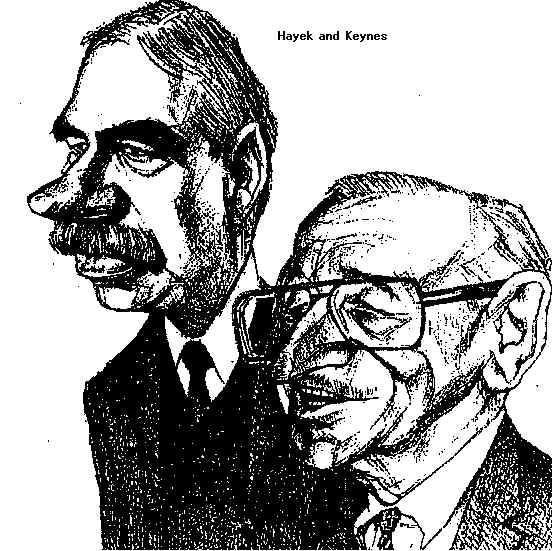 What do John Maynard Keynes, Michael Young, Thomas Balogh, Friedrich von Hayek, Milton Friedman, Eric Hobsbawm, Anthony Giddens, Phillip Blond, Tim Soutphommasane and Michael Sandel have in common? Apart from them all being intellectual men, they were, at one time or another, recognised, often by everybody except themselves, as ‘gurus’.
What do John Maynard Keynes, Michael Young, Thomas Balogh, Friedrich von Hayek, Milton Friedman, Eric Hobsbawm, Anthony Giddens, Phillip Blond, Tim Soutphommasane and Michael Sandel have in common? Apart from them all being intellectual men, they were, at one time or another, recognised, often by everybody except themselves, as ‘gurus’.
Watching the Labour Party conference in Manchester this week, I was stunned to see Professor Michael Sandel, the Anne. T. and Robert M. Bass Professor of Government at Harvard University, delivering an interactive lecture to conference delegates on the topic of his latest book; the ‘moral limits of markets’. On making his appearance, Professor Sandel was labelled as Miliband’s ‘new guru’ (following other past ‘new gurus’ including exclusively Maurice Glasman with his influential ideological sub-typography of Blue Labour and Tim Soutphommasane and his research on the synergy between patriotism and the ends of progressive, centre-Left politics). The latest ‘big idea’ of’ ‘predistribution’ (engineering markets to create fairer outcomes so much so that the need for redistribution is diminished) comes from Jacob Hacker.
Sandel might indeed be Miliband’s bone fide ‘new guru’, but a closer scrutiny into the role of the guru makes grim reading in two senses: firstly, gurus have little long-term influence on the ideational trajectories of political parties and their attendant political projects that their ideas are intended to service; and secondly, the guru’s lack of long-term impact suggests that the status of ‘ideas’ and their action-orientation is demoted below the seemingly more perennial concerns of statecraft and personality.
What is a guru? In Hinduism they are spiritual teachers and trusted counsellors. In British politics they take on a similar role. They are often luminaries in their academic field who are willing to abridge the troublesome divide between nationally-applied political practice and political theory. The function of ‘public intellectuals’ is often characterised puzzlingly as an attempt to suture the closed, cloistral athenaeum with the ‘real world’. The latter definition is ontologically confusing because the category of the ‘real world’, an attempt to demarcate an arbitrary rarefied world with a world that is presumed to be accessible and discernible by all, is a misnomer. The gurus seek, for various reasons, to bring their ideas, or the ideas that they purloin and popularise from others (i.e. Michael Young’s popularisation of concepts that had enduring roots in the progressive, social democratic tradition from thinkers such as R. H. Tawney and his concept of the ‘decent society’), to wider, public attention by disseminating their ideas to think-tanks (another mediator between practice and theory in contemporary British politics) in order that senior politicians take notice. Keynes offered the Attlee Government a macro-economic framework for post-war recovery; Hayek’s ‘market society’ offered Mrs Thatcher’s Tories a roadmap away from post-war social democratic serfdom; Giddens’s ‘Third Way’ socio-philosophy allowed ‘New’ Labour to synthesise or transcend the old dogmas of state-centric social democracy and neo-liberalism’; and Phillip Blond gave a critique of the market and the state in order for Cameron to claim ‘society’ and its renewal as the key priority of modern Conservatism. 
As suggested, these gurus have had varying degrees of influence with most having negligible rather than considerable influence. Of course, Keynes and Hayek are famous beyond being gurus to Attlee/Macmillan and Mrs Thatcher respectively. Their influence and corpus of work offers macro-economic/social solutions that are, grosso modo, atemporal, acontextual and thus applicable to periods of time other than the problem that they sought to address in their lifetimes. The post-Thatcher gurus such as Anthony Giddens (guru of Blair’s ‘new communitarian’ Third Way social democracy) and Phillip Blond (guru of Cameron’s Big Society civic conservatism) address problems of the time. These gurus’ ideas, especially in the Blair and Cameron periods, are used ephemerally when in Opposition and summarily dropped when entering government (i.e. Blair barely invoked the philosophy of the Third Way after 1999 and Cameron is yet to talk about the Big Society in 2012).
Political leaders and political office-seeking elites are not intellectuals per se. That is not to say that they are not intellectual and that they do not have a profound and sincere interest in ideas. Far from ideas only providing intellectual respectability to what a political party has always thought, the infusion of new ideas has the potential effect of changing the language and, more interestingly, the content of preexisting concepts, ideas and principles. Hence, politicians take an interest even if it politically self-interest as opposed to the pursuit of noble ideas. Andrew Rawnsley stated in The Observer, ‘Mrs Thatcher did not quote Hayek to voters. She told people she would sell them their houses.’ Mrs Thatcher and her Conservatives were able to translate, like the utilitarians in the 1830s, ideas into policies and actions. Therefore, in a majority of cases and circumstances, the use of ideas are functional, even with governments as ideologically self-conscious as the Thatcher governments. However, in order for these ideas to have greater traction, the contention here is that politicians need to take ideas more seriously in the first place. For Miliband’s twin core-concepts of ‘predistribution’ and ‘responsible capitalism’ to translate into a ‘moral economy’, he needs to treat the gurus and their ideas seriously to allow for coherent and successful translation from abstract concepts to practical policy.








No Comment